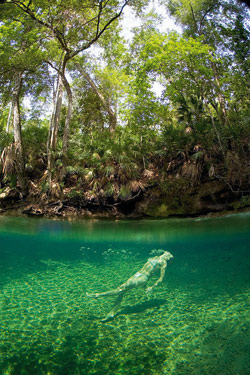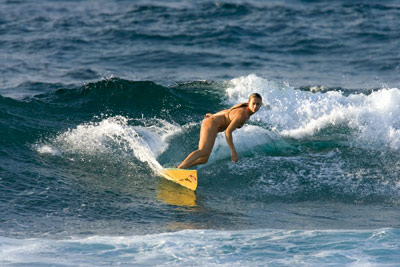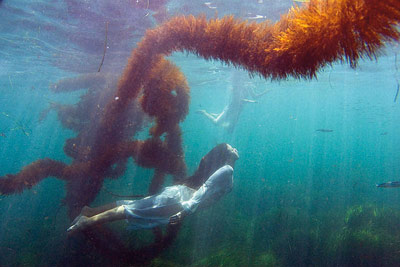How long have you been worried about the planet?
Being aware and caring for the planet and nature runs in my family. My grandparents were farmers and artisans who raised their five children with their own organic garden and animals in the French countryside. Now I live on Maui, which blends an ocean surfing lifestyle and a town full of greenery. I’m always hiking around tropical forests, waterfalls and coastlines. I started worrying about nature in my teenage years through school. We did beach cleanups, and there was always lots of trash on the side of hidden, smaller roads. I did my final paper in my last year of school on the Kyoto protocol. But the more I grow and discover the more I worry about our planet.
What worries you the most?
Population growth and the decrease of nature, as humans are invading it. And how many people live life without thinking about or being environmentally friendly? How many of us actually maintain or give back to nature and the planet? We can’t stop society but we can improve it.

Why do surfers have a special responsibility to protect the planet?
Surfing is very close to nature, obviously via the ocean. Surfers require swell and waves created by healthy weather patterns, clean waters and beaches to keep healthy bodies. We also need a normal ozone layer so we don’t get fried like fish on a barbeque. Surfers are usually somehow sensitive to nature, especially the weather and wind conditions. Because surfing needs many ingredients to be fun and firing, we need to keep the environment clean, healthy and functioning naturally to be able to live happily. In other words, surfers depend on the planet more than most and feel very close to it.
How did you get involved with Homeblown and their eco board?
Getting involved in this project has been very exciting. It started randomly like many things in life. At the spring 2007 Rip Curl Europe Seminar, a conversation started about what Rip Curl was working on at the time to be more ecological. So, it was pretty interesting to get the news update until someone mentioned something about new materials for surfboards being tested as natural plant related materials. As polite and professional as the place and conversation was, I wanted to say, “STOP, what is this all about?”
After a lot of pestering on the subject, I learnt about a group of scientists in England creating and testing plant and naturally based materials and products to make surfboards. My eyes, mind and heart sparked. Finally the essentials of surfing are really becoming environmental. Not just people trying, talking and acting about other subjects when we all know the what and how of surfboards, wetsuits and etc.

Since I believe this is one of the most impressive things I have seen or heard of in the history, lifestyle and industry of surfing, I kept calling and talking to the people in the project to get me to try a couple of eco boards. Then last summer at the Newquay Boardmasters Pro in England, I got to test the eco boards with Nathan Hedge. The inventors at Homeblown asked our opinions and we entered an eco tag team during the event. Finally the dream was achieved, and I got two of my own eco Boards, in my hands with a big smile! Supposedly I am the first pro surfer to own eco boards, and I got to surf, test and enjoy them in lots of waves in England, France, Portugal, Spain, San Francisco, Maui, Sand beach breaks, Rock breaks, point breaks, reef breaks. I’ve been giving feedback but I don’t have too much to criticise. This is the future!
Why are normal surfboards bad for the planet?
Normal surfboards are created with toxic products, which harm and pollute our planet. Foam, fibreglass, resin needs toxic production, which creates harmful excess wastes, and once a surfboard finishes its life then what… more trash. We’re lucky to have these normal surfboards so we surf well with quality performance but it’s bad for the planet. The nice thing with eco boards is that’ll create a big change, and provide a big choice for shapers and surfers. The goal of eco boards is that shapers, glassers and sanders will work without masks and protection and the excess wastes and surfboards at the end of their life use will be able to be thrown in the backyard for example, because they’re not anymore toxic than today’s fruits and veggies, which are full of pesticides anyway.

Would you advise people to try it?
Yes it doesn’t hurt to try, and it feels good to own something environmental friendly. At last surfing can be environmental friendly!
Are you optimistic or pessimistic about the planet’s future?
I’m optimistic because life will move on no matter how humans influence our planet, but there are also lots of possibilities, solutions and motivated people out there. I also believe every person, rich or poor can make an effort, and every little detail does make a difference for our planet. It doesn’t take much, it takes many, and we are many.
What else does Rip Curl do for the planet?
15 per cent of the summer 2008 range is made from organic cotton. They collect and recycle wetsuits, creating other things with them. Rip Curl and WWF (World Wildlife Foundation) have created Coral Guard, where Rip Curl surfers get together to talk about environmental situations facing the oceans, reefs, coast, and marine life in the area to then bring awareness and understanding to the public. In the offices, computers are turned off, paper is recycled and reused paper, and water is conserved.
For more info on Elise and her Homeblown eco board go to ripcurl.com or homeblown.co.uk

